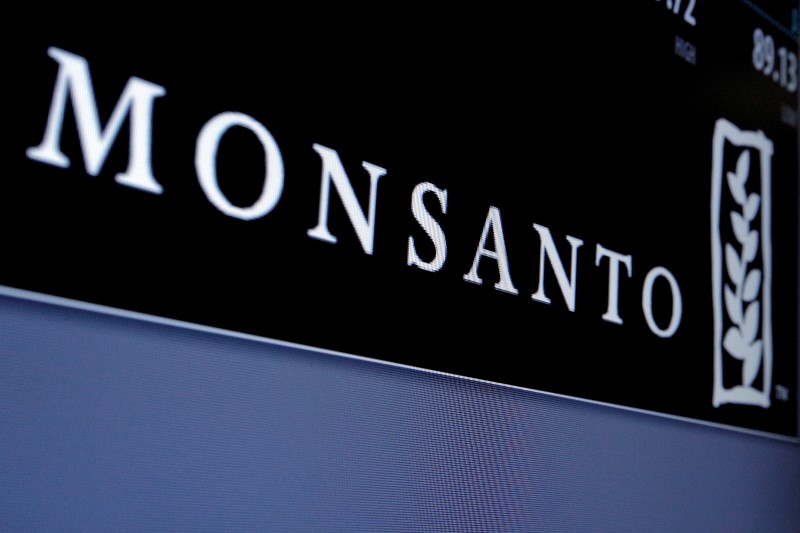By Diane Bartz and Greg Roumeliotis
WASHINGTON D.C./NEW YORK (Reuters) - As the global agricultural sector races to consolidate, Bayer AG's (DE:BAYGn) $66 billion all-cash deal to acquire Monsanto Co (N:MON) will test growing political and consumer unease in the United States and abroad over the future of food production.
Bayer’s pesticide-focused agricultural business has few overlaps with Monsanto's dominant seed franchise, according to the companies' executives. Still, marrying two of the world's top farm suppliers, at a time when rivals are also merging, is fuelling concern over fewer players competing in the $100 billion global market.
Monsanto and Bayer "have chosen to do a deal in the year of merging dangerously," said David Balto, a former policy director at the U.S. Federal Trade Commission. "They are in for a tough time."
U.S. Senate Judiciary Committee Chairman Chuck Grassley has called a hearing next Tuesday to scrutinize the wave of consolidation. Farmers in Iowa, the Republican senator's home state, are worried that seed and chemical costs are rising while a global glut of grain has pushed prices close to their lowest levels in years. Farm incomes have plunged.
Monsanto agreed to sell itself to Bayer for $128 per share in cash, yet its shares were hovering around $107 on Wednesday, reflecting the significant regulatory uncertainty surrounding the deal in the minds of investors. Bayer has agreed to pay Monsanto a $2 billion breakup fee if regulators thwart the deal.
The German company aims to create a one-stop shop for seeds, crop chemicals and computer-aided services to farmers.
That was also the idea behind Monsanto's swoop on Syngenta AG (S:SYNN) last year. The Swiss company fended off that offer only to agree later to a takeover by China's state-owned ChemChina.
U.S. chemicals giants Dow Chemical Co (N:DOW) and DuPont (N:DD) plan to merge and later spin off their respective seeds and crop chemicals operations into a major agribusiness.
If all of the deals close, three companies would control nearly 70 percent of the world's pesticide market and 80 percent of the U.S. corn-seed market.
Other agricultural sectors are also consolidating.
Canadian fertilizer producers Potash Corp of Saskatchewan Inc (TO:POT) and Agrium Inc (TO:AGU) said on Monday they agreed to merge, sparking questions of whether the new company's potential pricing power would attract tough regulatory scrutiny. [nL3N1BO378]
INEVITABLE SCRUTINY
Dealmakers trying to push through aggressive mega-deals in corporate America have had a tough year.
Antitrust authorities have challenged deals ranging from oilfield services mergers to health insurance buyouts, while other regulators have sought to crack down on deals that aid tax avoidance or risk harming national security.
Wednesday's announced tie-up between Monsanto and Bayer, the largest-ever all-cash acquisition, will inevitably face an intense and lengthy regulatory process in the United States, the European Union and elsewhere, regulatory experts said.
"This merger is not a slam dunk," said Diana Moss, president of the American Antitrust Institute.
Hugh Grant, Monsanto's chief executive, told reporters on Wednesday the companies will need to file in about 30 jurisdictions for the merger.
The value of the assets that Bayer is willing to divest is to be revealed by next week, when details of the merger agreement with Monsanto become public, according to sources familiar with the deal.
Areas of potential overlap include some soybeans, canola and cotton seeds.
Bayer's share of the U.S. cotton seed market sits at 38.5 percent, while Monsanto is at 31.2 percent, according to data compiled by the Konkurrenz Group.
Monsanto and Bayer have had "initial contacts with regulatory agencies describing what this combination would be about," Bayer Chief Executive Officer Werner Baumann said on an investor call on Wednesday, and "received encouraging feedback."
TOUGH YEAR
But U.S. antitrust enforcers will look at more than product overlaps in assessing the proposed merger, said Moss.
"People don't get the enormous impact that these deals can have on innovation markets. You need more innovators in there battling it out so that you actually do produce new technology for farmers,” she said.
The deals would leave farmers facing a duopoly in seed (Bayer/Monsanto and Dow) and two big firms in chemicals (Syngenta and Bayer/Monsanto), she said.
In terms of the U.S. corn seeds and traits market, according to Morgan Stanley (NYSE:MS) Research, a merged Dow and DuPont would have about a 41 percent market share, while a merged Monsanto-Bayer would have about 36 percent share. In soybean seeds and traits, the group estimated a merged Dow/DuPont would have about 38 percent. Monsanto-Bayer would have 28 percent.
One unknown factor that will influence these ag-related deals is the U.S. political landscape after the November federal election.
Maurice Stucke, formerly in the Justice Department now with the Konkurrenz Group, said it was highly unlikely that Obama administration antitrust enforcers, who have knocked down a long list of big mergers in concentrated industries this year, would make the final decision in the Bayer-Monsanto deal.
"Merger reviews of this complexity would take six to nine months," Stucke said. "This would be the first major test of the new administration."
